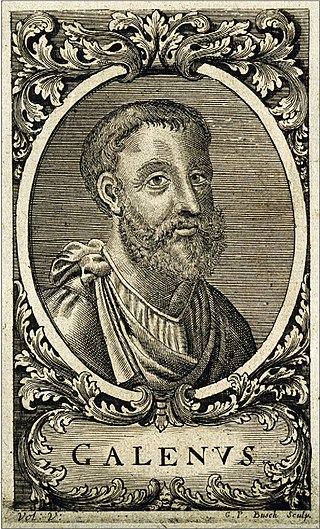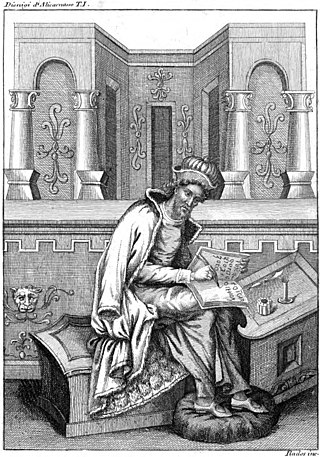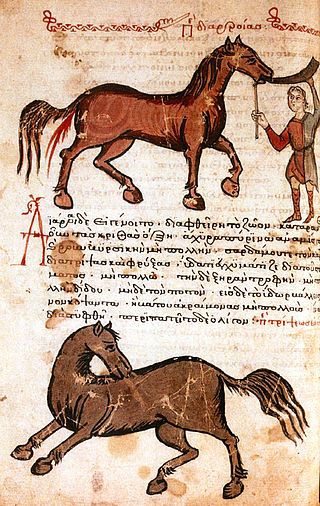Related Research Articles

Apuleius was a Numidian Latin-language prose writer, Platonist philosopher and rhetorician. He was born in the Roman province of Numidia, in the Berber city of Madauros, modern-day M'Daourouch, Algeria. He studied Platonism in Athens, travelled to Italy, Asia Minor, and Egypt, and was an initiate in several cults or mysteries. The most famous incident in his life was when he was accused of using magic to gain the attentions of a wealthy widow. He declaimed and then distributed his own defense before the proconsul and a court of magistrates convened in Sabratha, near Oea. This is known as the Apologia.

Classics or classical studies is the study of classical antiquity. In the Western world, classics traditionally refers to the study of Classical Greek and Roman literature and their related original languages, Ancient Greek and Latin. Classics also includes Greco-Roman philosophy, history, archaeology, anthropology, art, mythology and society as secondary subjects.

Aelius Galenus or Claudius Galenus, often anglicized as Galen or Galen of Pergamon, was a Roman and Greek physician, surgeon and philosopher. Considered to be one of the most accomplished of all medical researchers of antiquity, Galen influenced the development of various scientific disciplines, including anatomy, physiology, pathology, pharmacology, and neurology, as well as philosophy and logic.

Latin is a classical language belonging to the Italic branch of the Indo-European languages. Considered a dead language, Latin was originally spoken in Latium, the lower Tiber area around Rome. Through the expansion of the Roman Republic it became the dominant language in the Italian Peninsula and subsequently throughout the Roman Empire. Even after the fall of Western Rome, Latin remained the common language of international communication, science, scholarship and academia in Europe until well into the 18th century, when regional vernaculars supplanted it in common academic and political usage. For most of the time it was used, it would be considered a dead language in the modern linguistic definition; that is, it lacked native speakers, despite being used extensively and actively.

Claudius Ptolemy was an Alexandrian mathematician, astronomer, astrologer, geographer, and music theorist, who wrote about a dozen scientific treatises, three of which were of importance to later Byzantine, Islamic, and Western European science. The first is the astronomical treatise now known as the Almagest, although it was originally entitled the Mathēmatikē Syntaxis or Mathematical Treatise, and later known as The Greatest Treatise. The second is the Geography, which is a thorough discussion on maps and the geographic knowledge of the Greco-Roman world. The third is the astrological treatise in which he attempted to adapt horoscopic astrology to the Aristotelian natural philosophy of his day. This is sometimes known as the Apotelesmatika but more commonly known as the Tetrábiblos, from the Koine Greek meaning "Four Books", or by its Latin equivalent Quadripartite.

The Vulgate, sometimes referred to as the Latin Vulgate, is a late-4th-century Latin translation of the Bible.
Zosimus was a Greek historian who lived in Constantinople during the reign of the eastern Roman Emperor Anastasius I (491–518). According to Photius, he was a comes, and held the office of "advocate" of the imperial treasury. Zosimus was also known for condemning Constantine’s rejection of the traditional polytheistic religion.

Gaius Suetonius Tranquillus, commonly referred to as Suetonius, was a Roman historian who wrote during the early Imperial era of the Roman Empire. His most important surviving work is a set of biographies of 12 successive Roman rulers from Julius Caesar to Domitian, properly titled De vita Caesarum. Other works by Suetonius concerned the daily life of Rome, politics, oratory, and the lives of famous writers, including poets, historians, and grammarians. A few of these books have partially survived, but many have been lost.

Proserpina or Proserpine is an ancient Roman goddess whose iconography, functions and myths are virtually identical to those of Greek Persephone. Proserpina replaced or was combined with the ancient Roman fertility goddess Libera, whose principal cult was housed in the Aventine temple of the grain-goddess Ceres, along with the wine god Liber.

Dionysius of Halicarnassus was a Greek historian and teacher of rhetoric, who flourished during the reign of Emperor Augustus. His literary style was atticistic – imitating Classical Attic Greek in its prime.

Pedanius Dioscorides, "the father of pharmacognosy", was a Greek physician, pharmacologist, botanist, and author of De materia medica —a 5-volume Greek encyclopedia about herbal medicine and related medicinal substances, that was widely read for more than 1,500 years. For almost two millennia Dioscorides was regarded as the most prominent writer on plants and plant drugs.

The Laws of the Twelve Tables was the legislation that stood at the foundation of Roman law. Formally promulgated in 449 BC, the Tables consolidated earlier traditions into an enduring set of laws.
Maximus Planudes was a Byzantine Greek monk, scholar, anthologist, translator, mathematician, grammarian and theologian at Constantinople. Through his translations from Latin into Greek and from Greek into Latin, he brought the Greek East and the Latin West into closer contact with one another. He is now best known as a compiler of the Greek Anthology.
Macrobius Ambrosius Theodosius, usually referred to as Macrobius, was a Roman provincial who lived during the early fifth century, during late antiquity, the period of time corresponding to the Later Roman Empire, and when Latin was as widespread as Greek among the elite. He is primarily known for his writings, which include the widely copied and read Commentarii in Somnium Scipionis about Somnium Scipionis, which was one of the most important sources for Neoplatonism in the Latin West during the Middle Ages; the Saturnalia, a compendium of ancient Roman religious and antiquarian lore; and De differentiis et societatibus graeci latinique verbi, which is now lost. He is the basis for the protagonist Manlius in Iain Pears' book The Dream of Scipio.

Gnaeus Naevius was a Roman epic poet and dramatist of the Old Latin period. He had a notable literary career at Rome until his satiric comments delivered in comedy angered the Metellus family, one of whom was consul. After a sojourn in prison he recanted and was set free by the tribunes. After a second offense he was exiled to Tunisia, where he wrote his own epitaph and committed suicide. His comedies were in the genre of Palliata Comoedia, an adaptation of Greek New Comedy. A soldier in the Punic Wars, he was highly patriotic, inventing a new genre called Praetextae Fabulae, an extension of tragedy to Roman national figures or incidents, named after the Toga praetexta worn by high officials. Of his writings there survive only fragments of several poems preserved in the citations of late ancient grammarians.

The thyroid cartilage is the largest of the nine cartilages that make up the laryngeal skeleton, the cartilage structure in and around the trachea that contains the larynx. It does not completely encircle the larynx.
Marcellus Empiricus, also known as Marcellus Burdigalensis, was a Latin medical writer from Gaul at the turn of the 4th and 5th centuries. His only extant work is the De medicamentis, a compendium of pharmacological preparations drawing on the work of multiple medical and scientific writers as well as on folk remedies and magic. It is a significant if quirky text in the history of European medical writing, an infrequent subject of monographs, but regularly mined as a source for magic charms, Celtic herbology and lore, and the linguistic study of Gaulish and Vulgar Latin. Bonus auctor est was the judgment of J.J. Scaliger, while the science historian George Sarton called the De medicamentis an “extraordinary mixture of traditional knowledge, popular (Celtic) medicine, and rank superstition.” Marcellus is usually identified with the magister officiorum of that name who held office during the reign of Theodosius I.

The transmission of the Greek Classics to Latin Western Europe during the Middle Ages was a key factor in the development of intellectual life in Western Europe. Interest in Greek texts and their availability was scarce in the Latin West during the Early Middle Ages, but as traffic to the East increased, so did Western scholarship.

European science in the Middle Ages comprised the study of nature, mathematics and natural philosophy in medieval Europe. Following the fall of the Western Roman Empire and the decline in knowledge of Greek, Christian Western Europe was cut off from an important source of ancient learning. Although a range of Christian clerics and scholars from Isidore and Bede to Jean Buridan and Nicole Oresme maintained the spirit of rational inquiry, Western Europe would see a period of scientific decline during the Early Middle Ages. However, by the time of the High Middle Ages, the region had rallied and was on its way to once more taking the lead in scientific discovery. Scholarship and scientific discoveries of the Late Middle Ages laid the groundwork for the Scientific Revolution of the Early Modern Period.

The Hippiatrica is a Byzantine compilation of ancient Greek texts, mainly excerpts, dedicated to the care and healing of the horse. The texts were probably compiled in the fifth or sixth century AD by an unknown editor. Currently, the compilation is preserved in five recensions in 22 manuscripts ranging in date from the 10th to the 16th centuries AD.
References
- ↑ Greek, Roman and Byzantine Studies. Duke University. 1979. pp. 371–375.
Sources
- Adams (2018-07-17). Pelagonius and Latin Veterinary Terminology in the Roman Empire. BRILL. ISBN 978-90-04-37736-3.